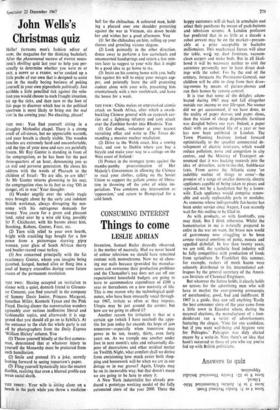Things to come
CONSUMING INTEREST LESLIE ADRIAN
Invention, Samuel Butler shrewdly observed, is the mother of necessity. Had we never heard of colour television we should have remained content with monochrome. Now we sit chew- ing our nails because (provided the ,manufac- turers can overcome their production problems and the Chancellor's hxe does not cut off our expectations) household budgets are going to have to accommodate expenditure of £100 a year or thereabouts on a new necessity of life. This is one reason why the technological quid- nuncs, who have been unusually vocal through- out 1967, irritate as often as they impress. Utopia may be just around the corner; but how are we going to afford it?
Another reason for irritation is that at a certain age (which I have reached) the appe- tite for jam today far exceeds the hope of jam tomorrow—especially when tomorrow may prove to be ten, twenty, thirty, even forty years on. As we trample one another under foot in next month's sales and exhaustedly dis- pose of decorations and other residual matter on Twelfth Night, what comfort shall we derive from envisioning how much easier both shop- ping and housework will be when we are in our dotage or in our graves? Again, Utopia may be on its inexorable way; but that doesn't mean we are going to be here to enjoy it. A New York industrialist has already pro- duced a prototype working model of the fully automated store of the year 2000. There the happy customers will sit back in armchairs and select their purchases by means of push-buttons and television screens. A London professor has predicted that in as little as a decade a robot servant may be on the market—presum- ably at a price acceptable to bachelor millionaires. This mechanical Jeeves will clear the table, was up, dust furniture, vacuum- clean carpets and make beds. But in all likeli- hood it will be necessary neither to visit the autostore personally nor to have direct deal- ings with the robot. For by the end of the century, forecasts the Postmaster-General, our children will be able to shop from their draw- ing-rooms by means of picture-phones and run their homes by remote control.
It is true that some of the delights adum- brated during 1967 may not fall altogether outside our income or our life-span. No sooner did we get accustomed, if we have done, to the reality of paper dresses and paper shoes, than the vision of cheap disposable furniture was dangled before our eyes. Indeed, a paper chair with an estimated life of a year or two has now been exhibited in London. The Town Planning Institute looked forward optimistically to the speedier commercial de- velopment of electric mini-cars, which would reduce pollution, noise and congestion in city centres, and the Ministry of Transport an- nounced that it was backing research into the idea of driverless, coin-in-the-slot, bubble car taxis. From across the Atlantic came 'an indelible outline of things to come'—the promise of a range of smaller domestic electric appliances capable of being taken to pieces and repaired, not by a handyman but by a house- wife. Each appliance would comprise remov- able and easily replaceable parts or modules. As someone whose indispensable fan-heater has been under service since August, I can scarcely wait for this outline to be filled in.
As with products, so with foodstuffs, you may think. But I think otherwise. Whilst the humanitarian in me is naturally prepared to enlist in the war on want, the brave new world of gastronomy now struggling to be born arouse visceral emotions of panic, nausea and appalled disbelief. In less than twenty years, we are told, the synthetic food industry will be fully competitive with production of foods from agriculture. In Frankfurt this summer, for example, rashers of mock bacon were solemnly distributed to his international col- leagues by the general secretary of the Ameri- can Institute of Chemical Engineers.
But whatever the future holds, it clearly holds no terrors for the advertising men who will have to market the ever-growing cornucopia of merchandise, good, bad and indifferent. If 1967 is a guide, they can sell anything.'Easily the best consumer story of the year came from a little town in Ecuador where, during the mayoral elections, the manufacturer of a foot- deodorant ran a series of advertisements featuring the slogan, 'Vote for any candidate, but if you want well-being and hygiene vote for Pulvapies.' Pulvapies was duly elected mayor by a write-in. Now there's an idea that hasn't occurred to those of you who say you're fed up with British politicians.


































 Previous page
Previous page